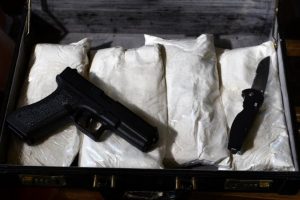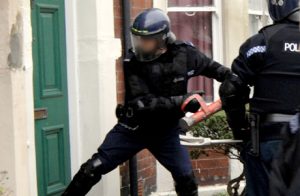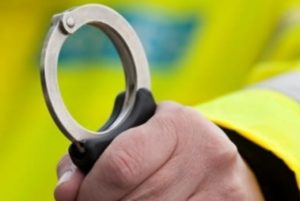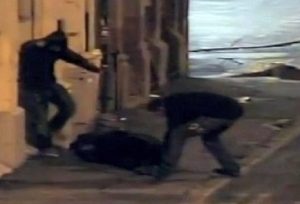Violence and Corruption – True Costs of the Drug War
I was sat in an unmarked police car waiting and watching. It was a house that we had been collecting intelligence on for weeks. My partner and I had been waiting for this day.
We were watching a person called John; a new dealer to the area. He had moved from Rochdale a few months previously, wanting to take a chunk of the heroin trade from the streets of Burnley. The intel we had available was an interesting read – John was mad about guns, explosives, and military field craft. In addition to this he was of less than sound mind and violent. One of the reasons he moved was because he thought he could disappear into the criminal world of Burnley after finishing a sentence for having homemade explosives in his basement.
The problem was he moved into an area Tony, my partner, and I were working on. We had cleared out the dealers that had been servicing the needs of local drug network for years. When we spoke to informants we were told no one was selling drugs in the Leyland Road area because it was known Tony and I were tough on drugs and would kick their door in again, and again. This hardnosed approach of kicking down doors and locking people up, warning them to stop dealing or we would make their lives hell, seemed a great strategy. We were getting impressive results; crime fell and the residents were happy. There was a flaw however. Although I’d devised a strategy based on all the latest techniques and trends, what it didn’t take into account is that there is always someone crazier and more violent waiting to up the stakes in the domestic drug war. And John was that man, a hardened criminal prepared to always go one stage further.
We had gathered intel from all our informants and conducted surveillance on the property. We knew enough to pay him a visit – it was what we had been working up to. As we waited we chatted and joked about the usual stuff that was going on around Leyland Road and the latest station gossip. Surveillance is often portrayed as something glamorous on television and books, but in practice you often end up sat in a van using a bottle for a toilet, bored to tears, or sometimes you didn’t even have a van and would have to find a suitable hiding place. Once upon a time if you were lucky you would sit in an older person’s home and would be presented with tea and cake. But things were changing; we had to be aware of collateral damage.
After a while we saw John, our target, return home. Game on. We had briefed a team from a support unit who would gain entry, help detain anyone and would conduct the search. We gave them the nod. The team approached the end terrace dressed in their overalls, helmet, and covered head to toe in body armour. They reminded me of people who walk out early during a service or performance on their tiptoes as if their tentative steps would make them invisible. The support unit acted in a similar manner as they sneaked around the sides of the house. No matter how stealthy they thought they were being, they weren’t. But they were good at their jobs. As the first strike was made to the front door with the big, red battering ram we jumped out of our car and made our way inside where all hell was breaking loose.
In these situations we always move fast with aggression and with the element of surprise. We didn’t want to give them a chance to get rid of any evidence or get hold of any weapons that might be scattered around. I entered the house to see John was detained and being searched by the support unit. He was being gobby, as we would say, and gave me all the usual threats we’d come to expect. I left him with the police team, knowing my time would come in the interview process. Now was the time to turn this house upside down and find all the evidence we could.
Street level dealers aren’t usually the tidiest people from my experience. I wondered if the idea was to keep the place so untidy just to make it more difficult for the police when they called. We found some cannabis, scales, bags, burnt foil and other bits of drug paraphernalia but not the stash we were expecting.
My partner Tony wandered into the back yard and I was talking to some of the support unit who, being their normal enthusiastic selves, wanted to rip out a few fixtures and fittings to help find further evidence. After a couple of minutes Tony returned with an outstretched gloved hand containing what looked like a bag that had seen better days. As he approached he was poking around and unravelled the package to show another bag that was just a bit bigger than a golf ball.
We had something, but we also had a problem. It wasn’t in the house. We had a stack of circumstantial evidence and some drugs, but could we connect the two?
We went back to the station to interview John with his solicitor present. We tried and tried but they would give us nothing. We couldn’t connect John to the drugs and they knew it. Eventually we knew that we were going to have to put him on Part 4 Bail, pending further enquiries. We had fingerprints on the packaging, but I didn’t hold much hope because of two things: the package had been outside in the wet, so we would only stand any real chance of fingerprints inside the plastic wrap; and secondly, I had a strange feeling something wasn’t right. It would be a while before I would find out my suspicions may have been right about my partner Tony.
Over the next few days I began to get messages from informants and helpful community members that our suspect, John, was planning something. Initially it was nothing specific. Then I was told he was watching me and was telling people that if I wanted trouble I would get it. He said that I had started it and he was going to finish me. You often get threats as a cop, especially when you lock people up. But I was about to find out why our police strategies don’t work. John was not just going to increase the violence on the streets as a threat to informants – he was going to bring the violence to me.
We received a report that a man had been seen taking down registration numbers of cars in the police car park. The description fit John. But it wasn’t until I went to speak to an informant that I realised he was serious.
Tony and I picked up our informant with a cover story that we needed just so we could get her away from her acquaintances for a while. She went for a ride in an unmarked car and we headed out of Burnley. We noticed we were being followed by a motor bike so we had the informant crouch down in the rear foot well of the car. We hastily conducted a PNC check and confirmed it was indeed John. Before we could do anything he had pulled level with us and was riding alongside the car. He had a grin on his face as he lifted his hand and made a gesture as if to shoot us, before revving the bike and tearing away in front of us. The informant was panicked and started ‘spilling her guts’ about a variety of things. I was just hoping John hadn’t seen her with us in the back of the car.
One of the things the informant told us was how crazy John was and how he was obsessed with getting back at me in some way, saying I was a “bent cop”. I knew I wasn’t and it was nothing new to hear someone involved in the drugs world say that about a police officer.
I was advised to be aware and to use some anti-surveillance techniques but other than that I was told just to get on with it.
One day, sometime after, I heard a noise outside my house. I only had a small backyard and kept the back gate locked. My dog was barking and wouldn’t stop. I went outside to check everything was secure. The next thing I knew was something hard hitting me in the face. I wish it was like in the movies where you’re hit with something around the head but you don’t go down and you can just shake it off and carry on like nothing happened. But this wasn’t fiction; it was real life and those blows hurt. I was disorientated, wondering what on earth was happening. I was vaguely aware of someone saying something to me and then they were gone.
After the incident I moved to a new house in a new town about ten miles away. I started using one name at home and another at work. When I take into account the name I used working undercover, I’m surprised I could remember who I was half the time. To a degree I was protected but sadly no further evidence was found and my employers didn’t take any further action to protect me.
Eventually I returned to Burnley for a few catch-up pints with colleagues. When I arrived Tony was there already and had a drink waiting for me. I asked how things had been going since I left and he said things were okay. But as we exchanged small talk the conversation took a very unexpected turn and Tony went on to make the most amazing confession to me. He was a bent cop!
My former partner was stealing heroin from seizures and using it to pay informants. I didn’t want to know any more. Where else had corners been cut and liberties taken? I’d always been above board with Tony. I didn’t like corruption or unnecessary violence. As a police officer I was convinced I was fighting the good fight and that I had the tools to do the job. I never believed I had a right to assault anyone or break the law to get results. Now I found myself questioning the job. And I decided that I would take a certain course of action that day that was the polar opposite to everything I thought I knew.
When we use enforcement tactics to uphold drug laws it takes us, the police and communities, to a very dangerous place. The dealers have no option but to protect their interests and their businesses. The tools they can use are limited with the main option being to address their problems with violence. If police continually change tactics to remain one step ahead of the illegal drugs industry then there is no option but for the criminals to respond to protect themselves with increased violence. As my experience shows, it’s not just drug consumers that can become their victims, or undercover cops. These criminals will go after anyone, even a regular cop tackling drug crime. Our communities are not safe and police enforcement is making the problem worse. This is why I’ve reached the conclusion that having a controlled and legally regulated system for drugs is a far better tactic than the ones I was under instruction to carry out on the job.








